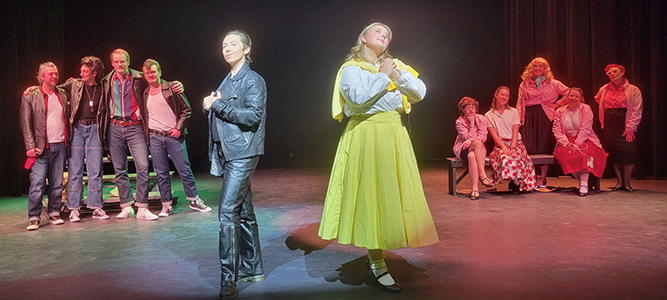— Orcasional Musings by Steve Henigson —

Back about 20 years ago, Frank Michels got it into his head that there should be a theatrical production of Ray Bradbury’s pro-book, pro-free-thought, science-fiction masterpiece, Fahrenheit 451, and that it should be put on within the small, grassy amphitheater which, back then, used to be found directly outside of the front door of the Orcas Library.
Frank decided to produce and direct Fahrenheit 451 as a “readers’ theater,” which meant that we, the members of the cast, were not obliged to memorize our parts. (Phew!) Rather, we read directly from our individual scripts, as we acted-out this very dramatic story about government-mandated censorship and mind control.
We portrayed people who belonged to a future dystopian society, in an English-speaking country where books and book-learning were forbidden by the law of the time. We were rebels, and the form of our rebellion was that each of us actually became a book, memorizing it to be able to recite its entirety from memory upon demand. Thus, ancient wisdom was to be preserved in the face of governmental political and social repression.
Bradbury’s important story device was that many words of the English language had been twisted and deformed, corrupting their meanings to suit the government’s purposes and propaganda. Thus, the enforcers of this brave new world’s endless, savage, anti-book campaign were the Firemen. But they didn’t put out fires; they started them.
Bradbury wrote that the normal, everyday book would begin to burn at—you guessed it—451 degrees Fahrenheit. And it was the solemn duty of each Fireman to bring as many books as he could ferret out to this specific starting temperature. Oh, and, by the way, it was perfectly acceptable to kill anyone found in possession of a book, while in the process of burning it.
You ought to read Fahrenheit 451, and enjoy discovering how the story comes out in the end. But the purpose of this essay lies elsewhere.
Frank wanted, as W.S. Gilbert once wrote, to “give artistic verisimilitude to an otherwise bald and unconvincing narrative,” so he petitioned the Orcas Library for as many derelict and unwanted books as they had on hand. As in Bradbury’s story, those of us in the cast who would be playing Firemen were going to burn those books! In public! Right in front of God and everybody!
The Orcas Library gave Frank a very large box full of unwanted books, and he brought it forth before the cast for our second rehearsal. But they were books! Books! So, just to be safe, we of the cast pawed through the huge stack, making sure that no items of interest or unacknowledged treasures had been accidentally included. To tell the truth, by the time that we were done pawing, all of those “unwanted” books had found new, appreciative homes.
All, that is, except for one lone book. There had been one, and only one, book in that huge box which everyone in the cast enthusiastically agreed was well worth burning. It was The Little Golden Book of Bambi.
And, on performance night, burn it we did.
**If you are reading theOrcasonian for free, thank your fellow islanders. If you would like to support theOrcasonian CLICK HERE to set your modestly-priced, voluntary subscription. Otherwise, no worries; we’re happy to share with you.**








I recognize this reaction. The only book I willingly tossed into the trash, rather than send it to a new home, was J. Edgar Hoover’s Masters of Deceit. Not sure how it found its way to me in the first place, but it was going no further.